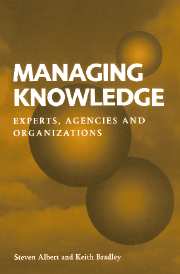Book contents
- Frontmatter
- Contents
- List of figures
- List of tables
- Introduction: the supply-side in context
- Part 1 Expert employees and their new organization
- Part 2 The labour market and the expert employee
- 7 AT&T's special employment policies for expert employees
- 8 An external temporary agency and expert employees
- 9 The Hollywood agency system
- 10 The Internet as an agent
- 11 Labour market segments re-examined
- 12 Agents and intellectual capital
- Appendix A Formal exposition of Winston model
- Appendix B Agency employment and search costs
- Notes
- References
- Index
7 - AT&T's special employment policies for expert employees
Published online by Cambridge University Press: 23 November 2009
- Frontmatter
- Contents
- List of figures
- List of tables
- Introduction: the supply-side in context
- Part 1 Expert employees and their new organization
- Part 2 The labour market and the expert employee
- 7 AT&T's special employment policies for expert employees
- 8 An external temporary agency and expert employees
- 9 The Hollywood agency system
- 10 The Internet as an agent
- 11 Labour market segments re-examined
- 12 Agents and intellectual capital
- Appendix A Formal exposition of Winston model
- Appendix B Agency employment and search costs
- Notes
- References
- Index
Summary
Our People are Our Competitive Advantage.
Robert E. Allen, Chairman and CEO, AT&TAmerican Telephone and Telegraph, AT&T, provides us with the first case of an agency-based system of at-will contracts in its in-house temporary agency Resource Link. It is the first example of our four examples of different types of labour market agencies. In the following chapters we look at (i) an external labour market temporary agency; (ii) the development of the Hollywood agency system and (iii) the Internet as a far-reaching expert employee agent. These examples are used to develop a more coherent understanding of agencies and what they do and do not provide expert knowledge-based employees. They are similar in some respects, but, as we examine the agency system, their differences become increasingly important. The differences, in the end, suggest that some agency systems can be more readily associated with a punctuated break from traditional labour markets of the past 150 years.
Because of its links to AT&T, a large traditional organization, Resource Link is the least radical of the agencies we examine. Many of the roles of a large firm, monitoring, co-ordination and team work, are left intact (perhaps due to organizational defence mechanisms we have outlined above). The case of AT&T highlights a basic dilemma. How can an organization uphold the organizational functions (monitoring, co-ordination and team-building) while supplying its employees with compensation packages necessary for their personal utility and their increased productivity? Not surprisingly, this is a familiar problem to the personnel and human resource departments of many large traditional corporations and has led to organizational adaptations towards structures which facilitate learning and greater flexibility.
- Type
- Chapter
- Information
- Managing KnowledgeExperts, Agencies and Organisations, pp. 107 - 119Publisher: Cambridge University PressPrint publication year: 1997



